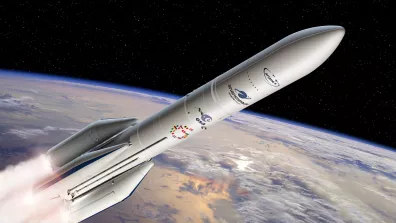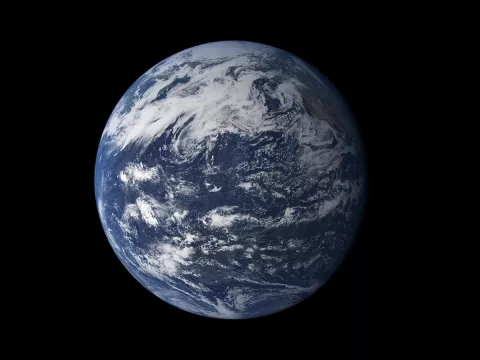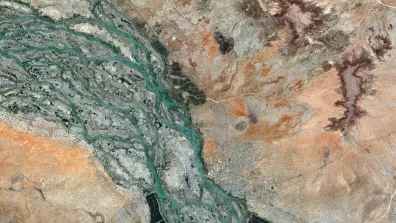CNES is the French space agency. Founded in 1961, the Centre National d'Etudes Spatiales is a programmatic agency, field centre and space operator encompassing all of the functions required to shape and execute the French government’s space strategy, and to deploy public policies that rely on the space sector (land management, agriculture, health, telecommunications, natural disasters, defence, etc.).
As one of the world’s leading space powers, and a key contributor to Europe’s space policy, our nation is deploying an ambitious strategy guided by four key goals that CNES is pursuing.
-
Maintaining and strengthening France and Europe’s strategic independence
With space fast becoming a competitive battleground, we must guarantee our ability to access space, develop civil and military systems and use our infrastructures, services and space data.


-
Sustaining and extending France’s scientific excellence
Space and exploration are driving advances in science in many fields of investigation. CNES is promoting French research’s involvement in ambitious international space missions.


-
Sustaining a competitive space ecosystem
CNES is supporting the rapid transformation of France’s space sector and sowing the seeds of a new space economy, working with companies of all sizes.


-
Working towards a sustainable world
Through CNES, France is a leading partner in flagship space missions vital to climate science and enjoys a lot of influence with its international partners. Our agency is supporting the ecological transition across the space sector.
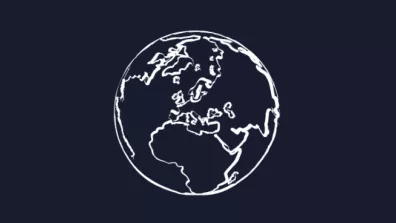

CNES is a government agency overseen by the Ministry of the Economy and Finance, the Ministry for Armed Forces and the Ministry for Higher Education, Research and Space.
In Paris, Toulouse and Kourou, CNES has more than 2,300 people working to project French excellence around the world and make France a partner of choice in the major science programmes shaping our future.

CNES offers foresight and strategic thinking, drives forward proposals and planning, and is tasked with executing France’s space policy. It represents France at the European Space Agency (ESA) and helps to make our nation’s voice heard at European Union level. It also keeps track of regulatory matters and implements the French Space Operations Act (FSOA). Lastly, it is the mainstay of space education and outreach in France.
CNES’s competencies and resources inform strategic government decisions, provide expert technical platforms and work with industry to conceive and specify the orbital systems, ground segments and launchers of tomorrow. To this end, the agency is laying the groundwork for the future, evaluates proposals and conducts projects in partnership with industry and research laboratories.
CNES ensures the availability of all operational facilities required to launch and position spacecraft and to support space operations in orbit. The agency is identified by the government as an operator of vital importance essential to the nation’s survival.
CNES by the numbers
- 1961: Inception of CNES
- 160 science projects and missions
- 2,350 employees in Paris, Toulouse and Kourou
- 3,029 million euros in 2024, a budget of €45 per capita per year
- 200 companies supported since 2017
- 115 cooperation agreements with 44 countries
- 70,000 people working in the French space sector
- 600,000+ young people involved in our education and outreach programmes every year
3 projects to follow in 2024-2025
-
SVOM
SVOM is a Chinese-French astrophysics mission to detect gamma-ray bursts.
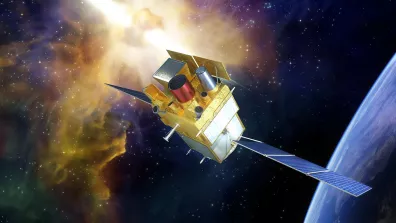
-
MicroCarb
MicroCarb is designed to map sources and sinks of carbon dioxide (CO₂)—the most important greenhouse gas—on a global scale.
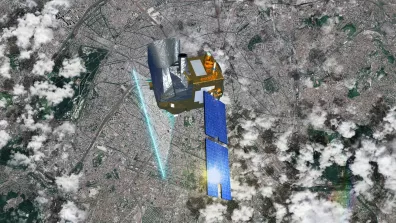
-
Ariane 6
The new-generation Ariane 6 launcher has successfully completed its maiden flight. The first commercial flight is scheduled for February 2025!
